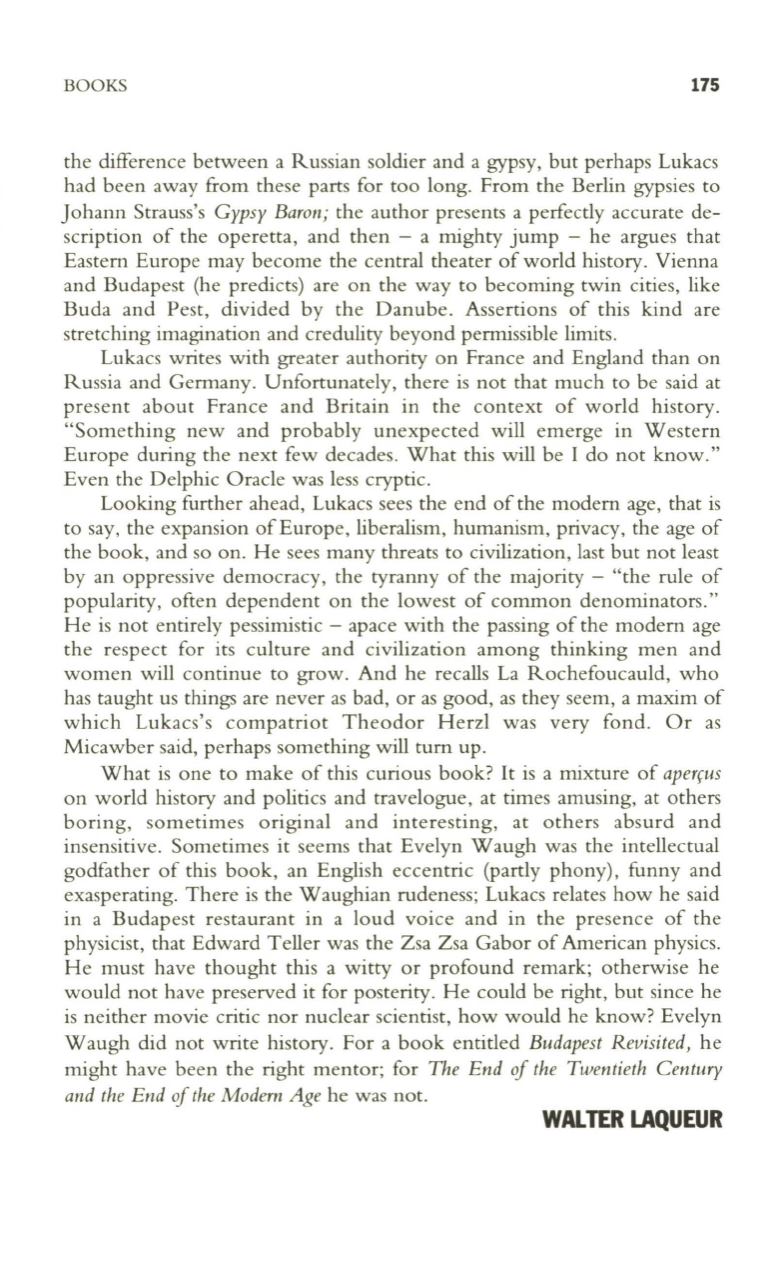
BOOKS
175
the difference between a Russian soldier and a gypsy, but perhaps Lukacs
had been away from these parts for too long. From the Berlin gypsies to
Johann Strauss's
Gypsy Baron;
the author presents a perfectly accurate de–
scription of the operetta, and then - a mighty jump - he argues that
Eastern Europe may become the central theater of world history. Vienna
and Budapest (he predicts) are on the way to becoming twin cities, like
Buda and Pest, divided by the Danube . Assertions of this kind are
stretching imagination and credulity beyond permissible limits.
Lukacs writes with greater authority on France and England than on
Russia and Germany. Unfortunately, there is not that much to be said at
present about France and Britain in the context of world history.
"Something new and probably unexpected will emerge in Western
Europe during the next few decades. What this will be I do not know."
Even the Delphic Oracle was less cryptic.
Looking further ahead, Lukacs sees the end of the modern age, that is
to say, the expansion ofEurope, liberalism, humanism, privacy, the age of
the book, and so on. He sees many threats to civilization, last but not least
by an oppressive democracy, the tyranny of the majority - "the rule of
popularity, often dependent on the lowest of common denominators."
He is not entirely pessimistic - apace with the passing of the modern age
the respect for its culture and civilization among thinking men and
women will continue to grow. And he recalls La Rochefoucauld, who
has taught us things are never as bad, or as good, as they seem, a maxim of
which Lukacs's compatriot Theodor Herzl was very fond. Or as
Micawber said, perhaps something will turn up.
What is one to make of this curious book?
It
is a mixture of
aperrus
on world history and politics and travelogue, at times amusing, at others
boring, sometimes original and interesting, at others absurd and
insensitive. Sometimes it seems that Evelyn Waugh was the intellectual
godfather of this book, an English eccentric (partly phony), funny and
exasperating. There is the Waughian rudeness; Lukacs relates how he said
in a Budapest restaurant in a loud voice and in the presence of the
physicist, that Edward Teller was the Zsa Zsa Gabor of American physics.
He must have thought this a witty or profound remark; otherwise he
would not have preserved it for posterity. He could be right, but since he
is neither movie critic nor nuclear scientist, how would he know? Evelyn
Waugh did not write history. For a book entitled
Budapest Revisited,
he
might have been the right mentor; for
The End of the Twentieth Century
and the End of the Modern Age
he was not.
WALTER LAQUEUR


